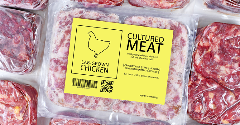News
Kersia acquires Holchem, becomes Europe’s second biggest food safety company
4 Jun 2020French biosecurity and food safety firm Kersia acquired UK-based Holchem, one of the leading players in the UK food and beverage hygiene sector. The financials of this deal were not disclosed, but it was backed by the private equity investment company Ardian.
This acquisition marks Kersia’s expansion to 120 countries and makes it the second largest food safety firm in Europe. “This merger will enable us to make new solutions and services available to Kersia’s customers throughout the world, and in the same way, will provide Holchem’s local teams and customers with Kersia’s solutions to help combat contamination by pathogens of the food chain in one of the world’s largest food processing regions,” said Kersia CEO Sébastien Bossard in a statement.

Although Kersia’s mission to combat the spread of animal and human diseases in the food chain is required in normal times, the outbreak of coronavirus has thrown the necessity of food safety measures into stark relief. In its merger, Kersia acknowledged the import of solutions explicitly dedicated to fighting the virus.
For the foreseeable future, both Kersia and Holchem will be refocusing operations towards providing the products which have been most in demand, such as disinfectant and hand-hygiene solutions. The two companies will also continue to support the rising requests for biosecurity protocols.
Going forward, this partnership will likely benefit from the high global health and food safety standards that the pandemic will give rise to.
Already, Kerisa invested in Kilco in 2018, which enabled the French group to gain a foothold in food safety within the UK livestock sector (dairy, poultry and swine). With the addition of Holchem’s two industrial sites in Bury and Liphook, which primarily provide safety solutions for food, beverage and dairy industries, this French conglomerate stands to gain ground as a market leader.
Recalls and contamination are already an expensive occurrence within the food industry and the importance of avoiding them will only grow as the pandemic brings food safety to the forefront of consumers' minds. According to a study by the Food Marketing Institute and the Grocery Manufacturers Association, the average cost of a food recall from contamination is $10 million, not to mention the subsequent damage to the brand and lost sales. If Kerisa can provide solutions to manufacturers throughout the UK that help alleviate the risk of a recall and allay the fears of both workers and consumers during the duration of the pandemic, the company stands to benefit tremendously from this acquisition.
Related news

‘Health’ labels on products reduce consumers’ willingness to pay
10 Mar 2025
A study into front-of-packaging “health” labelling finds that these labels alone can lower US consumers’ willingness to pay.
Read more
Food industry lags on healthier product formulation, nutrition index finds
7 Mar 2025
The world’s biggest food manufacturers derive just 34% of their sales from healthier products, according to the 2024 Global Access to Nutrition Index.
Read more
Does calorie labelling lead to reduced consumption?
27 Feb 2025
Calorie labelling of food products leads to a small, but consistent, reduction in the number of calories consumed, a study suggests.
Read more
F&B industry hit with fresh greenwashing claims
26 Feb 2025
The food and beverage (F&B) industry is under fresh scrutiny amid claims of greenwashing, with Arla the latest company in the firing line.
Read more
Have scientists discovered a new tool to measure UPFs?
19 Feb 2025
Researchers have developed a new scoring system and database, compiling over 50,000 food items, of which over 1,000 are classified as ultra-processed.
Read more
Singapore explores farmland-free food production
17 Feb 2025
Researchers discover new technology replicating on-farm food production conditions from within the indoor lab environment.
Read more
Most consumers lack trust in AI, but supplement users are ready to embrace the technology
14 Feb 2025
A survey of UK and US consumers found that most supplement users are willing to let AI make decisions on their behalf, but they also demand greater transparency.
Read more
Indians enjoy first bites of cultivated chicken
13 Feb 2025
The first public tasting of cultivated meat in India has taken place as the country prepares for the first commercial cultivated meat products – potentially as early as the end of this year.
Read more
Disruptor brands spearhead sustainable solutions
11 Feb 2025
Manufacturers, big and small, sharpen their focus by providing sustainable products and services centred on comprehensive and sustainable approaches to traditional methods.
Read more
The future of UPF regulation: Stricter labelling, more taxation, and no more conflicts of interest?
10 Feb 2025
Policymakers are intensifying efforts to regulate ultra-processed foods (UPFs), as mounting evidence links their consumption to increased risks of obesity, cardiovascular disease, and other chronic health issues.
Read more